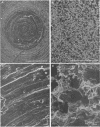Abstract
The importance of hydrogenase activity to corrosion of steel was assessed by using mixed populations of sulfate-reducing bacteria isolated from corroded and noncorroded oil pipelines. Biofilms which developed on the steel studs contained detectable numbers of sulfate-reducing bacteria (104 increasing to 107/0.5 cm2). However, the biofilm with active hydrogenase activity (i.e., corrosion pipeline organisms), as measured by a semiquantitative commercial kit, was associated with a significantly higher corrosion rate (7.79 mm/year) relative to noncorrosive biofilm (0.48 mm/year) with 105 sulfate-reducing bacteria per 0.5 cm2 but no measurable hydrogenase activity. The importance of hydrogenase and the microbial sulfate-reducing bacterial population making up the biofilm are discussed relative to biocorrosion.
Full text
PDF





Images in this article
Selected References
These references are in PubMed. This may not be the complete list of references from this article.
- Belay N., Daniels L. Elemental metals as electron sources for biological methane formation from CO2. Antonie Van Leeuwenhoek. 1990 Jan;57(1):1–7. doi: 10.1007/BF00400329. [DOI] [PubMed] [Google Scholar]
- Bryant R. D., Costerton J. W., Laishley E. J. The role of Thiobacillus albertis glycocalyx in the adhesion of cells to elemental sulfur. Can J Microbiol. 1984 Jan;30(1):81–90. doi: 10.1139/m84-015. [DOI] [PubMed] [Google Scholar]
- McCoy W. F., Bryers J. D., Robbins J., Costerton J. W. Observations of fouling biofilm formation. Can J Microbiol. 1981 Sep;27(9):910–917. doi: 10.1139/m81-143. [DOI] [PubMed] [Google Scholar]
- Weimer P. J., Van Kavelaar M. J., Michel C. B., Ng T. K. Effect of Phosphate on the Corrosion of Carbon Steel and on the Composition of Corrosion Products in Two-Stage Continuous Cultures of Desulfovibrio desulfuricans. Appl Environ Microbiol. 1988 Feb;54(2):386–396. doi: 10.1128/aem.54.2.386-396.1988. [DOI] [PMC free article] [PubMed] [Google Scholar]




